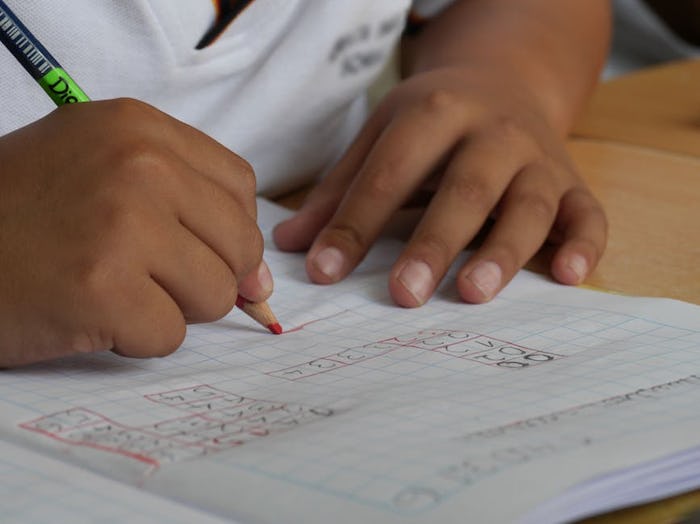Life
You’re Probably The Reason Your Kids Are Scared Of Math, Study Says
Most students feel a bit more comfortable with some subjects as opposed to others. For me, anything language-related wasn't intimidating in the least. But math? That was a whole other (tutor-filled) story. Growing up, it just seemed that math was easier for some kids than others, but a study published by the Association for Psychological Science shows that having parents who are scared of math may be the reason their kids feel the same way. As it turns out, genetics aren't even to blame — the real cause is a lot more environmental and within a family's control.
Expressing anxiety about math, according to research, makes all the difference. Statements from parents such as "I've never been good at math" and "math has always been confusing for me" have massive implications for a child's learning. Researchers found that if parents expressed an aversion to the subject while helping out with homework, then their elementary-aged children learned less math at the end of the year. Ultimately, their kids internalized anxiety about math that they carried with them.
Researchers also found that "when parents reported helping with math homework less often, children’s math achievement and attitudes were not related to parents’ math anxiety," according to the study. So if you can't keep the math-bashing to yourself, it might be best to let someone else take over the tutoring.
That's not to say you should tap out of homework help, though. If parents want to be intimately involved in a child's math learning, despite their own aversion to it, there are a couple of key strategies and activities that they can employ.
According to Psychology Today, Jennifer McCray, the principal investigator at the Erikson Institute’s Early Math Collaborative, suggests that in addition to eliminating negative talk about math, parents can take a lighthearted, game-like approach to math. Pointing out the playful math in everyday situations is a lot less daunting than staring at a worksheet for hours or trying to memorize multiplication tables with flashcards. Counting money at the store or measuring out ingredients while cooking are easy ways to make math more approachable.
McCray reinforces: Parents should continue to stay involved in their kids' learning as much as possible, just cut the "bad at math," anxiety-perpetuating narrative, according to Psychology Today. “Somehow, we’ve gotten to this place where it’s almost a fashionable thing to say you’re bad at math,” McCray further explained to The Chicago Tribune. "It creates the idea that math is for a special and unusual group of people. But math really does crop up every day in everybody’s life."
Just because you got straight C's in algebra doesn't mean your kids are doomed to the same fate. Keep the talk positive and you might have a calculus wizard on your hands.
